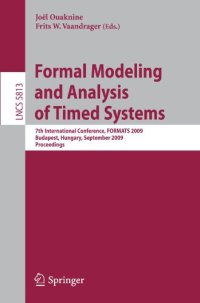
Ebook: Formal Modeling and Analysis of Timed Systems: 7th International Conference, FORMATS 2009, Budapest, Hungary, September 14-16, 2009. Proceedings
- Tags: Logics and Meanings of Programs, Theory of Computation, Models and Principles, Symbolic and Algebraic Manipulation, Programming Languages Compilers Interpreters, Software Engineering
- Series: Lecture Notes in Computer Science 5813 : Theoretical Computer Science and General Issues
- Year: 2009
- Publisher: Springer-Verlag Berlin Heidelberg
- Edition: 1
- Language: English
- pdf
This book constitutes the refereed proceedings of the 7th International Conference on Formal Modeling and Analysis of Timed Systems, FORMATS 2009, held in Budapest, Hungary, September 2009.
The 18 revised full papers presented together with 4 invited talks were carefully reviewed and selected from 40 submissions. The aim of FORMATS is to promote the study of fundamental and practical aspects of timed systems, and to bring together researchers from different disciplines that share interests in the modelling and analysis of timed systems.Typical topics include (but are not limited to):
– Foundations and Semantics. Theoretical foundations of timed systems and languages; comparison between different models (timed automata, timed Petri nets, hybrid automata, timed process algebra, max-plus algebra, probabilistic models).
– Methods and Tools. Techniques, algorithms, data structures, and software tools for analyzing timed systems and resolving temporal constraints (scheduling, worst-case execution time analysis, optimization, model checking, testing, constraint solving, etc.).
– Applications. Adaptation and specialization of timing technology in application domains in which timing plays an important role (real-time software, hardware circuits, and problems of scheduling in manufacturing and telecommunication).
This book constitutes the refereed proceedings of the 7th International Conference on Formal Modeling and Analysis of Timed Systems, FORMATS 2009, held in Budapest, Hungary, September 2009. The 18 revised full papers presented together with 4 invited talks were carefully reviewed and selected from 40 submissions. The aim of FORMATS is to promote the study of fundamental and practical aspects of timed systems, and to bring together researchers from different disciplines that share interests in the modelling and analysis of timed systems.Typical topics include (but are not limited to): Foundations and Semantics. Theoretical foundations of timed systems and languages; comparison between different models (timed automata, timed Petri nets, hybrid automata, timed process algebra, max-plus algebra, probabilistic models), methods and Tools. Techniques, algorithms, data structures, and software tools for analyzing timed systems and resolving temporal constraints (scheduling, worst-case execution time analysis, optimization, model checking, testing, constraint solving, etc.), applications. Adaptation and specialization of timing technology in application domains in which timing plays an important role (real-time software, hardware circuits, and problems of scheduling in manufacturing and telecommunication).